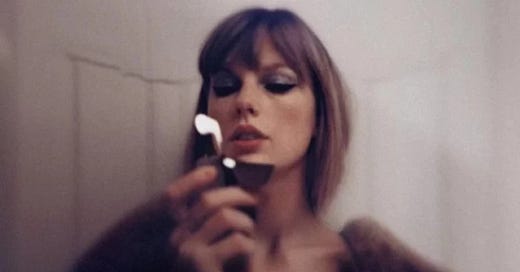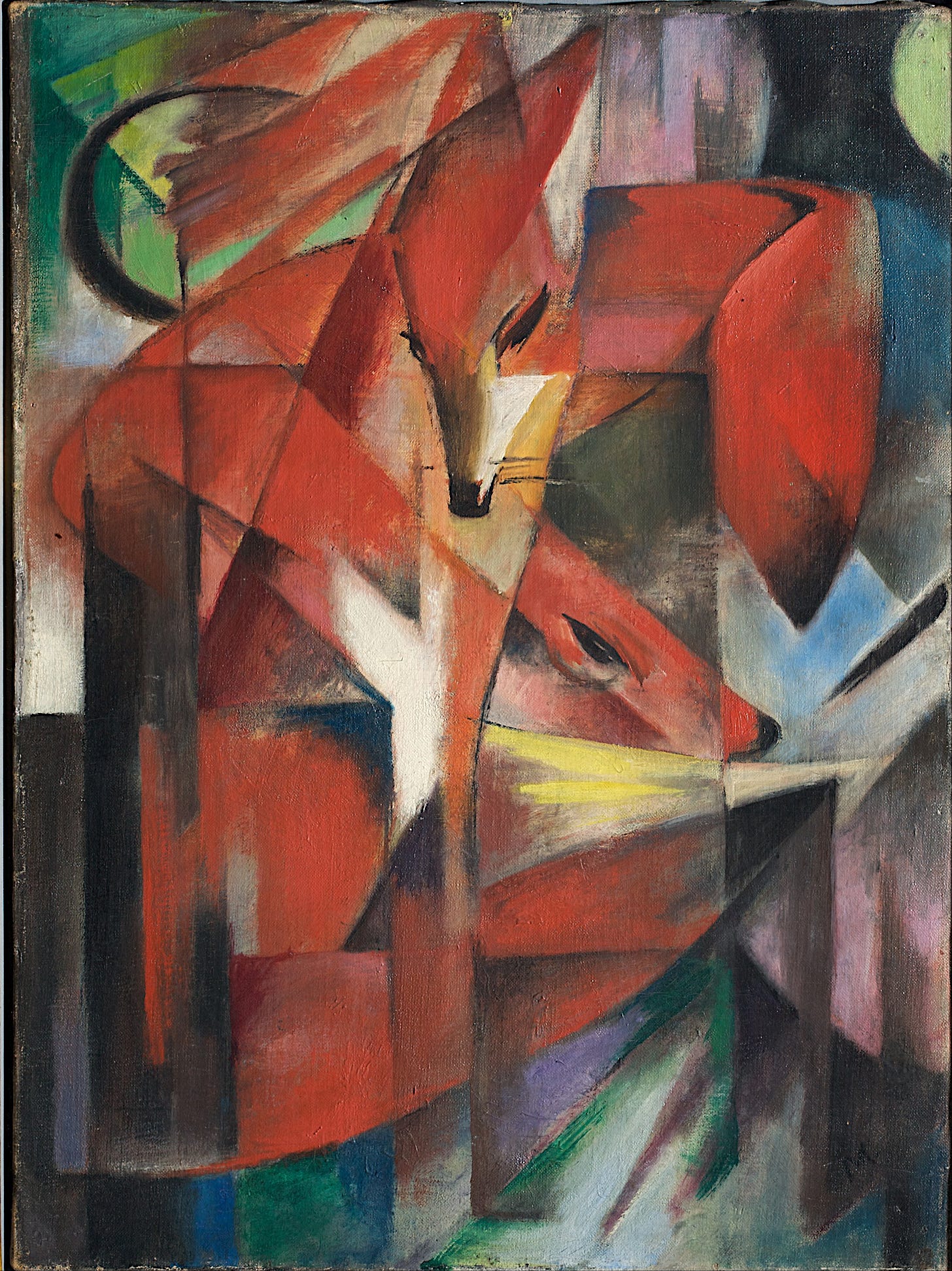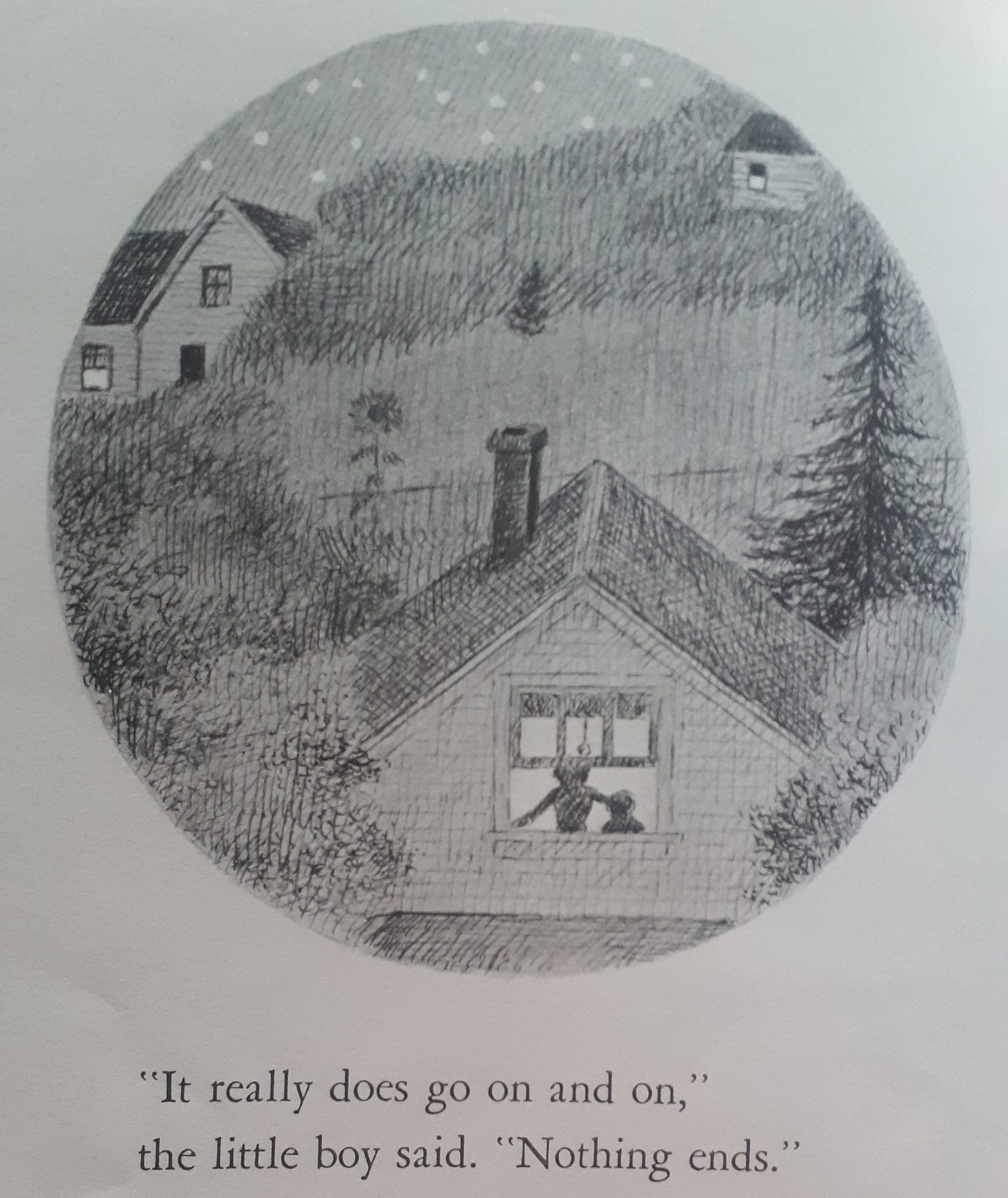You could say it doesn’t peak often enough, which I guess would prompt the question of why you need things to peak so often. Seems like that’d just be a longer way of flattening, given the first 200,000 years and whatnot. Anyway the peak on this album comes exactly where you were probably taught that a peak should fall on a line, and it isn’t as powerful when severed from that line. I’m a big boy and I can deal with that.
You don’t think I cringe too? Of course I cringe too. I cringe at that shit-eating sheepishness of the way she first sings, ‘It’s me…hi…’ in “Anti-Hero”, the first single. I cringe at that same song’s ‘sexy baby’/‘monster on the hill’ line that everybody ain’t wrong for dragging. I cringe that whenever she leans in to the more synthesized, ‘pure pop’ modes of production, she still feels the need to fill up so much space with her own vocal backup, no matter how vapid and pointless the effect. (‘Can I ask you a questiocanIaskyouaquestiooon!’; ‘at tea (tea!) time (time!)’ — that kinda stuff. Since this started with Max Martin a decade ago and remains a thing with Jack Antonoff here, I guess Taylor has to take the blame. It’s not surprising that a person who came up in country music would function most comfortably with a looser groove.) I cringe at the obnoxious lyrics in “Bejeweled”, not least ‘the penthouse of your heart.’ I cringe at all of “Vigilante Shit”, or I would if I hadn’t thrown that song where it belongs on the first day of listening; it’s just a lower-key “Bad Blood”, except it sucks even more because you kind of thought she was beyond this Bratzy backwash.
Oh, but friend, I cringe yet more! I cringe at the unintentionally funny way that Lana Del Rey goes ‘ha-haa-aaaa’ in “Snow on the Beach”, which sounds like a pill-blunted 12-year-old who’s trying to laugh at someone who left the room 10 minutes ago. I cringe at the way that same song quiets down into a silence-return that remains the corniest moment on the album. I cringe at the quasi-rapped bridges that remain consistently Taylor’s least-interesting vocal mode, and in fact I cringe generally (or at least wince) at her longtime struggles with bridges and middle eights: the half-hearted bits in “Midnight Rain” (‘I guess/Sometimes we all get/Just what we wanted’) and “Maroon” (‘and I wake with your memory over me’), for instance, or the slightly goofy harmony pile-up toward the peak of “Karma”, which reminds me a tad too much of that dippity-doo “Me!” bullshit from a few years ago. (Note that Swift’s best song to date, Evermore’s “Gold Rush”, solves the bridge problem by simply not bothering, instead falling inward toward new embellishments on the verse-chorus, wind rising forward aflush.) And I cringe at plenty more of the defensive ‘thanks for asking’ stuff in the lyrics, a passive-aggressive quality that Swift shares with mutual admirer Paul McCartney. (I should know, too: I live in Canada, and passive-aggression is the one and only thing that Canadians do better than anyone.)
It also comes out the gate pretty rough. ‘Sam Dew’ must know where some bodies are buried, he already mucked-up a solid third of Kendrick Lamar’s last album and now he gets his prints on another lead track to the newest album from one of the biggest pop stars in the world. Maybe Taylor and Kendrick hit someone with that translucent car from the “Bad Blood” video 10 years ago and ‘Sam Dew’ was the witness. Thus allowing Mr. Dew a perfect opening to fulfill his lifelong dream, of producing sterile slow-cruisin’ windshield pap. Seriously: when Taylor goes ‘I been under scrutiny’ and the backing Taylors immediately ‘answer’ with ‘yeah oh yeah’…I must’ve sat bolt upright, I mean that is a ‘ruh-roh!’ moment if ever I’ve heard one. Another Reputation? More awkward vulgarity, madam? Well, sort of — in the sense that the good stuff takes a while to grow and settle, and in the sense that the dumb parts really are quite dumb. But Midnights is like a more solitary and frankly depressed composite of all of Swift’s albums since 1989; whether it qualifies as a refinement can vary from moment to moment, but then, such is the nature of the times that brought us in. (Swifties can make charts tracing bits and bobs of previous tracks: the opener’s chorus = “I Think He Knows”…the high leap notes in the verses of “Snow on the Beach” = “Illicit Affairs”…the sassy cheerleader shouts in “Bejeweled” = “Shake It Off” and “Miss Americana & the Heartbreak Prince”…“High Infidelity” = a split between “August”, “Illicit Affairs”, and “Closure”….)
Previous Taylor Swift albums have not rewarded much on the ‘holistic’ end: structurally, sequentially, narratively, in the ‘mind’s-eye imagery’ sense of things. They’re collections of songs that share a ‘vibe,’ yeah — but in terms of a front-to-back ‘journey,’ à la the Rock LP model of old, they’ve been mixed at best. But I was getting forms and visions from Midnights even before it really bloomed, back when I was still furiously messaging friends incensed at what I thought was her least-interesting record yet. But that was October Nathan, and you should pay no mind to that jackass and instead listen (with rapt attention) to December Nathan. The album starts like music for back rooms and dim lights, eyes and gestures, jaws tight and airs chilly: things are low-key but high-stakes; there’s the anticipation of falling a touch too close with someone, and then away forever. Our hero then offers some confessional hotel karaoke and flees the scene, retreating into easy mobility — music for airplanes. The jokes write themselves, but I mean it seriously: these are sounds of flying over country, brushed with digital hums that rise and fall like easy machines — you’re on your own, kid. The music, including of course Taylor’s voice and words, becomes more artificial, lightheaded under pressure, until a second wind — another impromptu karaoke party, back in the hotel room at 2am with a small group of loved ones filling in their silences. Oft clumsy in the confessional expungings, yes. But in its clumsiness, allowing for deeper notes, truer states heretofore unnamed. Our hero falls in love, hits a peak, and comes down with a Rhodesy-lovvvvvely domestic denouement, and a summative surge of feeling to close.
Classic. Classic! An album, folks — how ‘bout it?!?! Within a week I was coming back to Midnights start to finish every time, with a frequency that I haven’t felt in…God, a few years at least. Even if we don’t count the several bonus tracks, which in this day and age we might as well - namely “Paris”, “High Infidelity”, and “Would’ve, Could’ve, Should’ve” - I wouldn’t argue with anybody who called this the best Taylor Swift album. (If you’ve read this far and are wondering why that’s supposed to be a thing worth caring about, I would direct you to this page, in which I tried to expound on Swift’s formal distinctions within contemporary popular music.)
People were dragging Jack Antonoff for a couple of days there, which was a bit vexing until it became clear (rather quickly) that these airheads didn’t even know what they were supposed to be mad about. Here’s a good rule of thumb: whenever a lot of people start complaining about the music of someone who isn’t singing, then that musician has probably done something interesting. Antonoff sublimates his grad-party-on-a-highway-bridge sensibilities into some truly imaginative synth harmonies - often sourced from mid-‘80s equipment - that are paced with a discipline and even elegance that’s rare to contemporary synthesized pop, yet without being particularly colorful. Quite the obverse, really: this is a profoundly discolored production, depressed and even aseptic in ways that actually enhance the effect, because more is left up to the singer-lyricist - the human being - to come to terms with their situation-circumstances. And so the many subtle things that are actually being developed over the course of the songs are partially concealed by the human, and then released with them in tandem. Now, would I prefer a producer who fancied a more vibrant and organic sense of color — of an in-the-room sense of studio space? Yes, I would - and maybe Antonoff can take a master class from Tchad Blake - but I also acknowledge that that is not our world. Which is not to make excuses for the present, mind you. (Hence the cringing.) But in this world? Hell yeah, dude: get your synth nerd on and gimme some subtle goddamn harmonies. In this world, I’ll take what I can get.
Basically this is a very sad album two-thirds of the way that feels even lonelier, even sadder, because more is left up to the words and voice to brace against the (ostensible) absence of passion anywhere else. And since Swift is only deepening as a lyricist and her command of the English language only growing more supple, the moments of extra-vocal ‘peak’ arrive with even more force. “Maroon”’s double-meaning, for instance, is applied to some dramatic end-of-days imagery, reinforced by heaving synth gurgles and soft early-Vocoder effects that Swift herself is soon imitating: the song creaks and groans into the deep-night air, and the distances implied (as sung) between ‘I see you every day now’ and ‘the mark you saw on my collarbone’ are heavy, heavy, heavy. (I don’t know if ‘the rust that grew between telephones’ quite works as a poetic image here, but the idea of what she’s getting at is powerful enough.) Conversely, the synthesized plucks in “You’re On Your Own, Kid” are like the dictionary definition of a colorless production…and yet that digital sterility tenses poignantly with Taylor’s words and singing: the song is written and sung to evoke a scatter of memories - some wistful, some shameful - that are swirling into a ball of charge. It’s as if you genuinely can’t remember how long ago any of it ever happened, or if it did, or if it matters: the jets lift up and down, and a lovely child’s-eye melody (‘aaall my days…’) curves into more heavy distances: ‘From sprinkler splashes to fireplace ashes’ into ‘The jokes weren’t funny, I took the money, my friends from home don’t know what to say,’ which is one of the more self-lacerating lyrics that Swift has ever written. (Though she’s still better at twisting the knife into others than into herself, e.g. ‘crying with your head in your hands/ain’t that the way shit always ends?’, or the last line of “High Infidelity”.) And so when there suddenly comes two hits on a snare drum toward the end of “You’re On Your Own, Kid”, it means something, dammit: you’ve been hitched up; the capping line - ‘you always have been’ - has turned from something forbidding into something comforting, and the production has mirrored that upsurge. Similarly, in “Karma”, the first time Swift sang the words ‘karma is my boyfriend,’ I thought: ‘That is the dumbest fucking thing I’ve ever heard.’ And then by the time she was singing it at the end of the song, I was flush with goosebumps.
Taylor’s whole ‘Oh, if only I could still be that simple corn-fed Merrill Lynch stockbroker’s daughter’ thing initially struck me as condescending at best and phony at worst, going back to at least “The Lucky One” a decade ago. But I guess that was bad faith, because she’s clearly drawn to these shades of civic sepia — she keeps coming back to them. Some of the best parts of her two previous albums, both made with the woodsy production hues of Aaron Dessner, come from Swift’s writing and singing about the distance between who she once was and how much of that ‘once’ remains ineradicable. On the new album, “Midnight Rain” opens: ‘My town was a wasteland: full of cages, full of fences, pageant queens and big pretenders/But for some it was paradise.’ Soon it moves into: ‘It came like a postcard: picture perfect, shiny family, holiday peppermint candy/But for him it’s every day,’ and the jet lifts off again. It’s complicated: there’s the feeling of both lamenting and yearning for where you came from, a past self, from an evermore vertiginous vantage.
Many have noted Taylor’s newfound flexing of her vocabulary, by which I guess we mean, ‘using bigger words,’ because her command of the English language has only been getting more and more supple since the beginning of her career. “Karma”’s ‘webs of opacity’ is stuffed and awkward, but the way she low-strides through “Anti-Hero”’s ‘my covert narcissism I disguise as altruism, like some kinda congressman’ is perfect, oh yes, and the rhyming of 'devices/prices/vices/crisis' is worth a toast. Plus there are just a boatload of heroic one-liners on deck here: ‘It must be exhausting always rooting for the anti-hero’ is one of her very best; ‘When you aim at the devil, make sure you don't miss’ is timeless advice; ‘Outside they’re push-and-shovin’/You’re in the kitchen humming’ is the hinge of that lovely domestic denouement, “Sweet Nothing”, which is just one of the sweetest love songs I’ve heard. Even small lines that seem like throwaways can catch you looping (‘I made you my world/Have you heard?/I can reclaim the land…’), and even “Snow on the Beach”, the song with Lana Del Rey…look, I think ‘Lana’ is the pop star for people who secretly (or not-so-secretly) have contempt for pop music. Algorithmically-constructed Sunday nihilism for the chattering classes; music for people who don’t actually care about music so much as they care about fashion. (Of course it’s a beach, it’s always a fucking beach.) But Taylor has found the ideal place for that voice: the background! The outro of “Snow on the Beach”, with both their voices singing together over plucked and falling strings (‘It’s coming down, it’s coming down…’), is oh so pretty, yes, but it has a dawning glare, a purity of sorrow (if not despair) that can feel damn-near apocalyptic in certain headspace. And hey: even if that collaboration didn’t come off, we could’ve still looked on the bright side: at least it wasn’t Phoebe Bridgers!
It’s again worth stressing that Antonoff’s production sustains a discipline that allows the peaks to arrive sparingly, but with more force. The aforementioned ‘sexy baby’/‘monster on the hill’ bit from “Anti-Hero” is already notorious, but it’s a sign of the pathetically impoverished state of music criticism that basically nobody has mentioned what immediately follows that line: under the lines ‘Too big to hang out, slowly lurching toward your favorite city/Pierced through the heart but never killed,’ a high glassy synth line pans channels into a violin, and then pulls back and *thwaaa*s off into the horizon like a slingshot. (Or was that a bow and arrow?) Magnificent! Similarly, an aforementionedly obnoxious device like ‘the penthouse of your heart’ (in “Bejeweled”) is immediately followed by one of those ‘striding’ patterns have long been one of Taylor’s distinguishing features as a singer-composer - ‘Diiiamonds iiiiin myyyy eyes…’ - and it moves ever more tartly because of Antonoff’s gleaming dots. I’ve seen people complain about the simplicity of those preset drum beats on “Anti-Hero” and “Karma”, but those decisions are perfect: anything busier or fancier would’ve been dishonest, because those two songs play like two different shades of that impromptu karaoke party. The steadiness means that the more ‘low-key climactic’ details are sharper, like that snare in “You’re On Your Own, Kid”, or the heartbeat kick-drum in “Karma” when she sings, ‘Aren’t you envious that for you it’s not?’ They stir the blood!
I haven’t even mentioned the backward whale-song noises in “Midnight Rain”, or the very high synth-string hook in the same song, which Antonoff teases by (sometimes) only playing a single note of it. Nor have I mentioned the glorious lift into Auto-Tune before the last set of choruses in “Question…?” (‘toniiIII-IIY-IIY-IIGHT!’), which is Taylor’s most delightful use of that tool ever (in a song that reminds me tonally of 1989’s “How You Get the Girl”). Nor have I mentioned the bendsy wobble of the manipulated voice that arrives midway through “Labyrinth”, a song that might secretly be the best music on the album: the hymnal consolation of ‘Breathe in, breathe deep, breathe out’ would be stunning enough, but it’s taken somewhere even further when paired with that synthesized pipe organ and, beginning with that line, a wolf-howling synth line. The effect is like being far above the clouds, and yet somehow the sudden entrance of an electronic drum doesn’t feel awkward. It’s been many a year since I’ve heard the words ‘I’m falling in love’ sound so convincing — a blissful plummet. God, the way that one voice keeps whispering through a high Vocoder effect as the song fades out…it’s like a lullaby.
None of the bonus tracks would’ve worked in sequence on the album proper, but they should still be considered as part of the same package. And with the exception of the draggy “Great War”, they’re all respectable. “Hits Different” is a fresh breeze; “Bigger Than the Whole Sky” is a conciliatory breakup lullaby with some welcome instrumental twang, though a bit underdeveloped; “Glitch” marks the return of Slick Dew, who knows what she did that summer, though I’ll concede that that commercial-clean guitar lick is nice and minimal (and there’s a witty waver applied to Taylor’s voice out of the first choruses). And three of the bonuses are superlative: “Paris”, “High Infidelity”, and “Would’ve, Could’ve, Should’ve” — particularly the last two, both leftovers from the Folklore and Evermore sessions with Aaron Dessner. “Paris” is a very sweet quick-cab for a photo wall, with a rising-breaths-through-the-club-doors quality to Antonoff’s production, and it has a fabulously endearing lyric: ‘And all the outfits were terrible/2003, unbearable!’ “High Infidelity”, which as I mentioned earlier seems to have been split into (or compiled from) three 2020 tracks, comes to an ‘instrumental’ break where Taylor ‘ooooh’s out a soft melody line, putting a slight yip on her upstrokes to make it sound like a coyote, and it’s simply one of my favorite things she’s ever done. It’s only eight bars, admittedly, but rarely does Swift sing so long without singing lyrics; it’s lovely, hearing her fall open from the campfire. “Would’ve, Could’ve, Should’ve”, meanwhile, is much more intense, an emotional gallop; it’s as good as anything on the album proper, and it’s also the only track on the whole package that could reasonably be called a ‘rock song’ (despite the lack of electric guitars). That song comes to an incredibly stirring outro where Swift (again rather atypically) repeats the same melody over and over again, with rising intensity; it’s some of the most passionate singing she’s ever done, and Dessner’s production blurs with vocal-synth effects, amniotic smoke signals. ‘And now that I’ve grown, I’m scared of ghosts/Memories feel like weapons’ — sorry folks, but that’s profound!
Aaaanyway. People say ‘There’s always great stuff’ when what they really mean is that there’s always adequate stuff. I think Midnights is a pretty great album: reflective of the fallout of trust and passion that seems consistent with the state of our will generally over the last couple of years, made by one of the only modern pop stars who’s actually capable of making hope and optimism seem…appealing. It’s an awkward position, y’know: to be a pessimist about the very things that give spirit. But I guess I really am cynical enough to believe that anyone who has an internet connection, and is thus able to hear a wide variety of both current and past music, and thinks that music today is in rude health - or that Alvvays or Mac DeMarco or Phoebe Bridgers or SZA or Perfume Genius or Snail Mail is making better music than Taylor Swift - must be either
(a) incredibly lazy;
(b) horrendously in-denial; or
(c) simply not all that interested in music.
‘Oh don’t take it so seeeeeriously!’ Maybe if you took your time and ‘took yourself more seriously’ you wouldn’t suck.
Which brings me to “Karma”, the climax of this album. Reading most reviews, you’d think “Karma” was a vicious and spiteful song, with people stressing the ‘above it all’ vantage point inherit in lines like ‘I keep my side of the street clean/You wouldn’t know what I mean’ or ‘Karma’s a relaxing thought/Aren’t you envious that for you it’s not?’ There’s a hierarchy there, for sure. And spite has always been an important part of Swift’s art — ain’t no denying it. But the thing is, I never heard the song that way, and I still don’t. That stuff is there, but it’s also less important than the cumulative effect of everything else that’s going on. The queasily re-starting “Style”-like synth pulse (or maybe that’s an “Eminence Front” pulse), as coupled with Taylor’s newly-confident strides, feels there to emphasize that ‘karma takes all my friends to the summit’ more than anything else. It seems, tonally, not to be a put-down of someone else, but a song that says, ‘Meet me here.’ The low awe of the way she sings ‘karma is a God’ at the very end of the song, and the way she purrs the word ‘relaxing,’ would make a housecat proud.
More pertinently, it exemplifies an ability to write about oneself in a way that could also apply to everyone. In this album’s opening song, when a fed-up Taylor demands ‘Get it off my desk!’, she could be singing from the point of view of an office worker or a schoolkid, and I believe that she knows it. In “Karma”, when she comes to the climactic moment before the final set of choruses, she sings, ‘Karma is the guy on the screen, coming straight home to me,’ and Taylor Swift would not be as popular as she is if such a line were only referring to her own actor boyfriend. It’s a line that’s meant to be just as applicable to someone who’s talking to their partner on FaceTime on their break from work. I dunno about you, but I like it when that happens. It’s one of the things that popular music, for all its juvenilia, tends to do rather well.
Whereupon “Karma” slams into its last set of choruses, except the mix is now full in bloom: the glimmering bell-harp glissandi (yes), which have been bubbling in and out over the course of the track, now splay through the floor expanding, lights upon lights — into the air without dissolve. Or was that airs? These are grand visions: she sees the world as an epic love story, and she seeks to preserve such stories, to keep them alive. I would highly encourage a very loud listen to the last set of choruses in “Karma”, and especially the part where she sings ‘karma is a God, karma is the breeze in my hair on the weekend.’ What’s happening there is that the synthesized harp and bells are curving into the high glare of another synth - all elements which were there previously, but not together - and it makes a whole separate home of sound, even though it’s just the slightest curve. ‘Aren’t you envious that for you it’s not?’ isn’t vicious; it’s just her forcing you into the position of considering the question. Karma is my boyfriend and my boyfriend is karma. Y’know? Karma is something to believe in - a relaxing thought - except that you actually get to vote for karma, and your legacy is secured by it. Some people die, and some people don’t.






